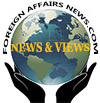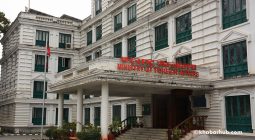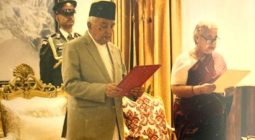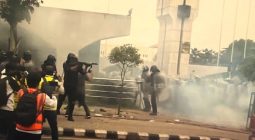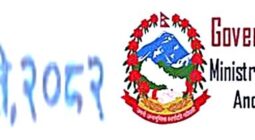
After all, Prime Minister of Nepal Khadga Prasad Sharma Oli gave his resignation to the President Ramchandra Poudel Tuesday afternoon.
President has accepted the resignation, the sources indicated.
Generation-Z groups are demonstrating peacefully over the decision to ban social platforms including Facebook, WhatsApp, Messenger, X, YouTube as well as over wider dissatisfaction with the political corruption that led to clashes between protesters and security forces.
Thousands of young people joined the protest that started on Monday but the security forces tried to suppress it by firing at them that killed over one and half a dozen students and injured over hundreds of people.
On Tuesday even clamped curfew by the government the protestors defied curfew. Violent protests continue across the country. The protestors also set fire into various government buildings including Government secretariat-Singh Durbar, Parliament building, Prime Minister’s official residence, President Office and many more. They also set fire on the private proprieties of the various political leaders across the country. Across the street of Kathmandu Valley many vehicles were also put on fire.
As the violent protest continues Nepal’s main International Airport—Tribhuvan International Airport has shut down, which has compelled it to divert the all-incoming international flights.
Meanwhile, President Ramchandra Poudel has urged all Gen-Z protestors and parties to engage in dialogue to resolve he crisis peacefully. According to the press statement of the President Office he also expressed confidence that dialogue with Gen-Z representative other stakeholders could pave the way towards peaceful settlement.

Likewise, Chief of Army Staff of Nepal Army Ashok Raj Sigdel has called on pretesting groups to come forward for dialogue to seek a peaceful solution. In a statement issued by the Nepal Army stressed on that protecting the nation’s historical, cultural, archeological and national assets is a shared responsibility of all citizens.
Meanwhile, according to the UN News report, UN human rights chief Volker Türk expressing deep concern over the deaths and rapid deterioration, he warned issuing a statement from Geneva that “violence is not the answer” thus called on authorities and demonstrators alike to de-escalate the spiralling crisis.
“Dialogue is the best and only way to address the concerns of the Nepalese people. It is important that the voices of young people are heard,” he stressed, urging both security forces to show restraint and protesters to refrain from destructive acts.
While condemning the crackdown, he also voiced concern about violence by some demonstrators.
“I am disturbed by reports of public buildings, businesses and private residences being attacked and, in some instances, set ablaze. Equally, I am concerned by reports of physical attacks on senior government officials.”
UN chief echoes call for restraint
Briefing for journalists in New York on Tuesday the Secretary-General’s Spokesperson Stéphane Dujarric said that the UN chief António Guterres was “very saddened by the loss of life” and reiterated his call for restraint to prevent further escalation and is “closely following the situation.”
“The authorities must comply with international human rights law, and protests must take place in a peaceful manner that respects life and property,” Mr. Dujarric said, noting the dramatic images emerging from Nepal.
Call for prompt investigations
The UN News also added that, the UN Country Team in Nepal echoed those calls, extending condolences to the families of the dead and urging authorities to ensure that law enforcement responses remain “proportionate and in line with international human rights standards.”
“Freedom of expression, access to information and peaceful assembly are fundamental rights protected under Nepali and international law,” the UN team said.
“All allegations of excessive use of force should be investigated promptly in an independent, transparent and impartial manner,” it added.

UN ready with support
High Commissioner Türk appealed to all sides to avoid further escalation, recalling Nepal’s history of emerging from conflict to forge peaceful democratic institutions.
“The world has admired Nepal’s emergence from conflict to become a peaceful democracy,” he said.
“Together with the United Nations system, my Office stands ready to support dialogue and trust-building measures that can help de-escalate tensions and restore confidence.”
The UN Country Team in Nepal reinforced that message, emphasising that “the voices of young Nepalis have been heard loud and clear” and warning that lasting stability will depend on concrete steps to address the root causes of their grievances, the news report added.
